|
||||||||||
1922 | 1934 | 1939 |
||||||||||
1922 Gram tied Dad’s outdoor shoes and he began to whimper. |
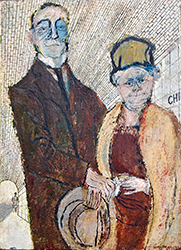 Possible Grandparents Oil paint, encaustic on Masonite. 22” x 16” |
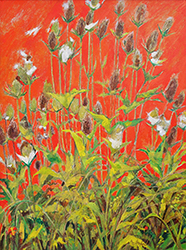 Teasels Dad’s last encaustic painting, c. 1990. Oil paint, encaustic on Masonite. 4’ x 3’ |
||||||||
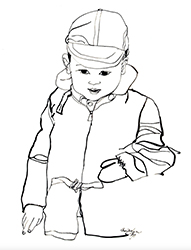 Lake Forest Boy Graphite on paper. 22” x 30” |
||||||||||
1934 “Mom, what does ‘Or bust’ mean?” twelve-year-old Dad looked up from his cartoon perusing. Gram learned the Buicks, Nashes, DeSotos. Plymouths, Chryslers, Rocknes and Stars came in a parade of rolling, rusting junk. “Flo, is that really an Apperson?” “Bess, those haven't been made for at least ten years.” Gram glanced again at Mac's drawing. The fence looked much better, and he was gesture sketching in dried corn stalks behind the wire fence. The sun had burned down on the green corn that for awhile had grown darker green to protect itself. The surface of the earth crusted over, becoming as pale as the cloudless and dusty sky. The leaves of the young corn lost their strength for want of water and tilted downward. Dad saw as he drew the bent stalk that it was bent over like the farmer he had watched walk into the cafe. He drew another stalk gestured to seem worn out like its caretaker, then another and another. The drawn field of corn became an army of bowed over, worn out, hungry farmers. Brown lines on the corn leaves widened and moved in to the central ribs. On occasion there appeared in the sky a high wispy cloud that gave no rain. Dry stream beds taunted the farmers with the memory of captured and flowing water. The sun pierced this world brutally. He was attempting to capture heat on paper with pencil. He wanted to show his father what they had seen when he got to California. The inventiveness in the drawing came from an inner, non-coercive order created by the trust between him and his mother. She allowed him the confidence to experiment by not interfering, while offering protection and continuity. |
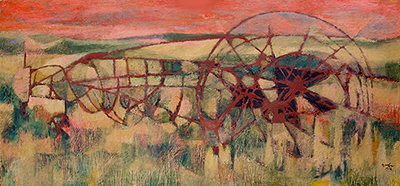 Farm Sunrise Encaustic on Masonite. 1956. 65” x 31” 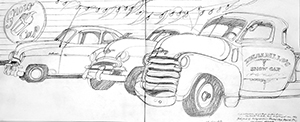 Old Chevrolets Graphite on paper. 14” x 34” 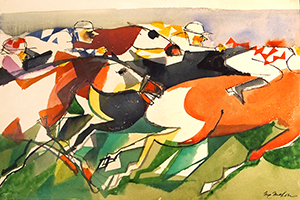 “Onward” 15” x 22” |
|||||||||
| 1939 Dad had a lilt to his step as he strolled to another Sienna Dance with a handkerchief peeking from his shirt pocket. He was impressed with what a little moonlight could do and decided it was now or never with Irene. She was a sophisticated young lady that had gone to his head, and he needed to let her know. Mom honed her endowed grass roots organizing with Saul Alinsky’s Catholic Youth Organization at her parish. She discovered that through her natural political ability she could take control of her own Our Lady of Sorrows Parish community and destiny. It was radical. By way of Dorothy Day, she discovered the Catholic Workers Movement to give aid directly to the poor and homeless. A good shepherd emerged from this combination. One who could cheerfully bring stray sheep into the fold by bringing out the best qualities in anyone. Rolled in Dad’s back pocket was his first published cartoon in Collier’s magazine. He was amazed at what these few pennies from heaven could do for his confidence. Mom was chatting with Mary, Len and Charlotte. “Why would you, Len, it’s not America’s problem?” Charlotte was begging for a reason. “What’s bigger than a world war…?” Len replied in his riddling way. “Lo and behold! If it isn’t a long drink of water!”Mom smiled at Dad. “Hi, Mac,” Mary and Charlotte said at the same time. “Hey, Mac, what’s bigger than a world war and smaller than a thumb?” Len redirected his question to his cartoonist friend. “The bullet that you dodge,” Mac replied, a bit peeved to be talking about Europe’s war. He had no interest in it and was tired of the constant conversation about it. “That's it, Mac, better than the one I had… I was going to say the bullet that gets you,”Len laughed. Just then, Billie Holiday’s rendition of Porgy and Bess’ “Summertime” started playing. “Irene, would you like to dance?” Dad took her gloved hand in his. Their blue eyes met, each clearly seeing the other. They turned and dipped to their living that was easy, becoming slowly more oblivious to their summertime surroundings. “Your daddy’s rich and your ma is good-lookin’, so hush, little baby, don’t you cry…” Dad twirled Mom. The world was just the two of them. He held her waist in his arm, his right drawing arm. Thoughts of their graduation from high school melted away, the giddy expectations of what they’d do next evaporated into a misty future. This one moment was their entire life. “Dance me to the blue-eyed children who are asking to be born, dance me through the curtains that our kisses have outworn,” the music carried them on. Love had never been so easy nor so close before. It was as though they had both reached the sheer precipice of childhood’s plateau at the same time. Hand in hand, they moved from dancing to light caresses and gentle kisses. “Goodnight, Irene…goodnight, Irene,” the music signaled the end of the Sienna night, as the two walked arm in arm to the Washington Ave bus. “Goodnight, Irene, good night, Irene…I’ll see you in my dreams…” As the song faded into the distance, the lyrics amplified in their minds. Dad escorted Mom to Central Park Boulevard, careful to walk on the street side in case a car splashed water, his handkerchief in his pocket just in case. This moment my parents fell in love came clear to me when I heard Madeleine Peyroux channel Billie Holiday in her recent rendition of Leonard Cohen’s “Dance Me to the End of Love,” a song reflecting on WWII. “Dance to your beauty with a burning violin. Dance me through the panic, until I’m safely gathered in. Lift me like an olive branch and be my homeward dove… show me slowly what I only know the limits of, dance me to the end of love." |
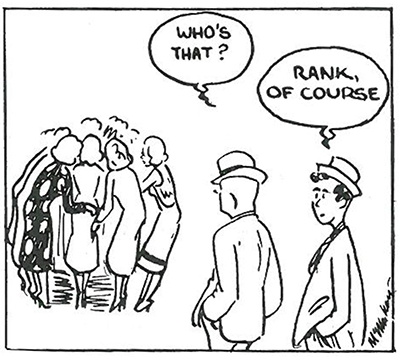 “Rank” cartoon, The Fenwick Wick 1938. Dad was Fenwick’s cartoonist in high school. 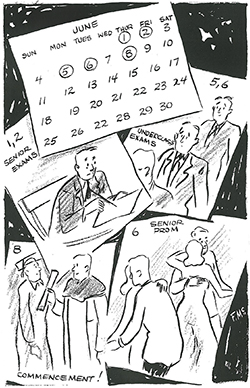 The Fenwick Wick 1939. |
|||||||||
| —page top— | ||||||||||
The Eternal Optimist | Parachuting Artist | Cut the Flak | Blog | Home |
||||||||||
|
For further information or to purchase art please contact: Margot@FranklinMcMahon.net MargotMcMahon.com
|
||||||||||

